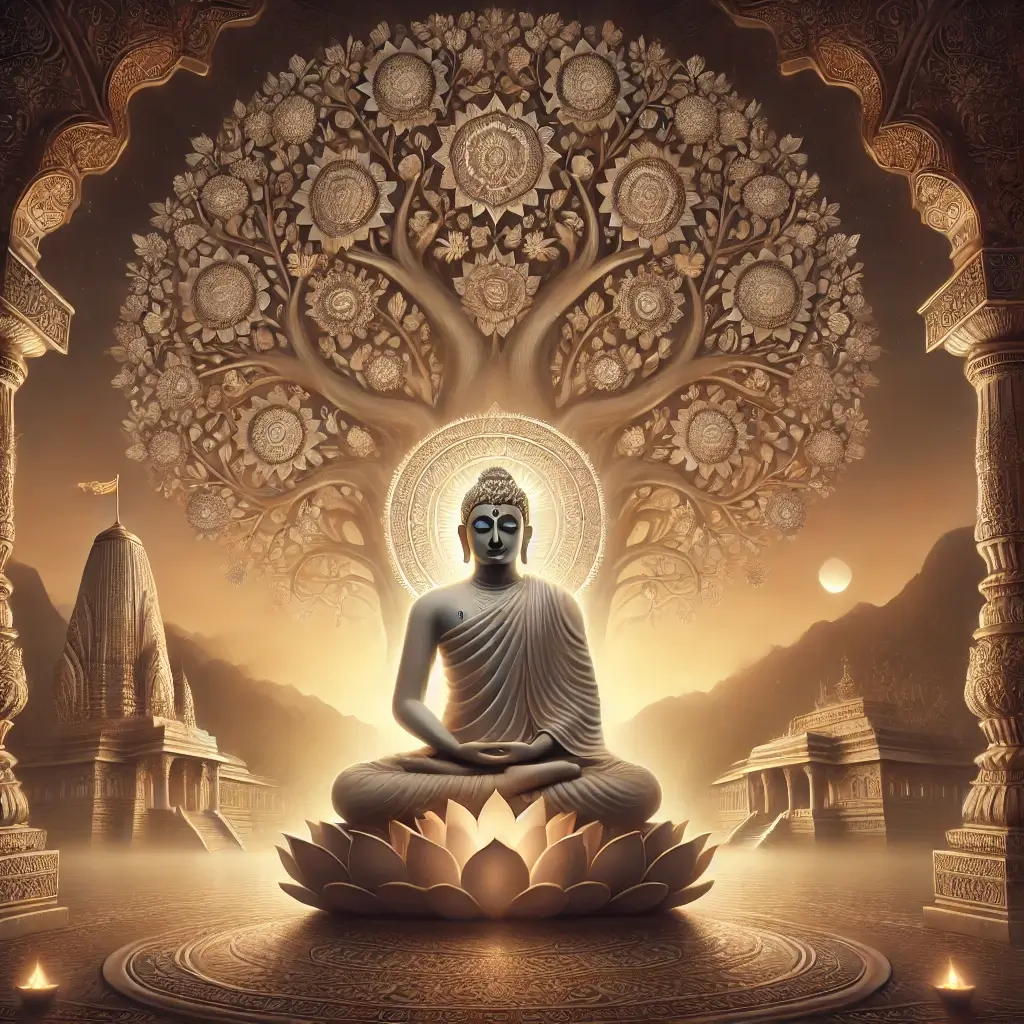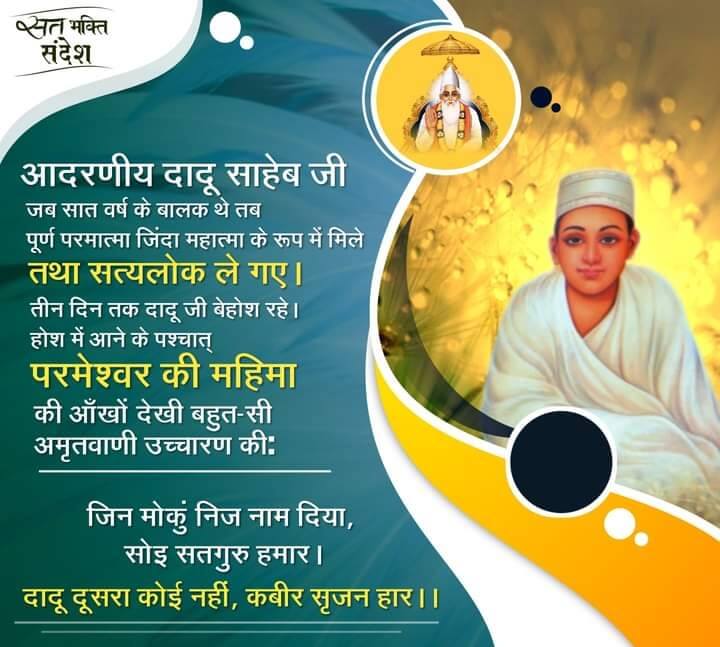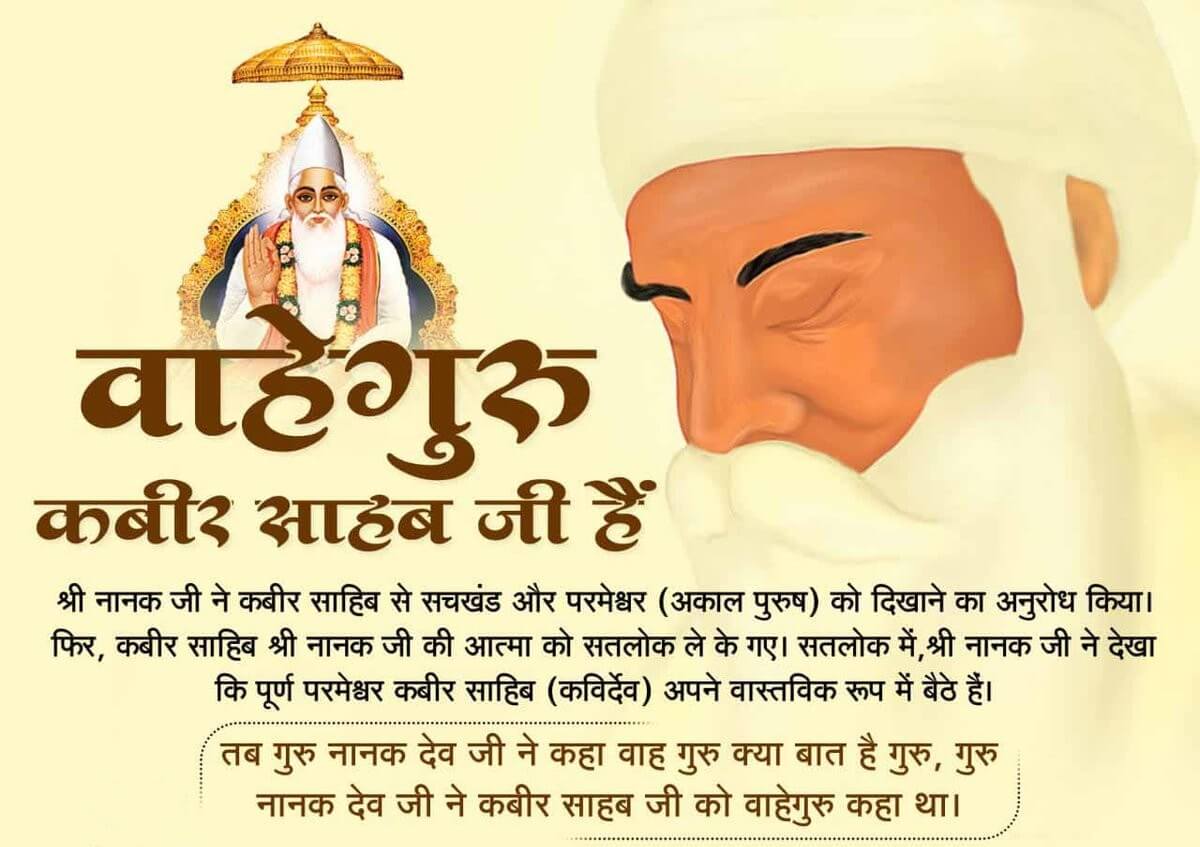Summary of Jain Dharm Bodh
In the 31st chapter of Kabir Sagar, titled "Jain Dharm Bodh" (found on page 1389), Supreme God Kabir Ji provides insight into the origin and essence of Jainism.

According to the narrative, King Nabhiraj of Ayodhya had a son named Rishabh Dev, who later became the ruler of Ayodhya. A righteous king, Rishabh Dev focused on the welfare of his people. He had two wives, 100 sons, and one daughter, with his eldest son being Bharat.
Kabir Ji, in the guise of a sage named "Kabi Rishi," approached Rishabh Dev to impart spiritual wisdom. Kabir Ji recited divine words, urging the king's soul to awaken from its worldly slumber and seek eternal peace. These teachings shook Rishabh Dev’s inner being. However, when Rishabh Dev sought further guidance from his family guru, he was instructed to practice austerities and hatha yoga for liberation. Trusting this advice, Rishabh Dev renounced his kingdom, bestowing it upon his son Bharat and his other offspring. He retreated to the forest in search of salvation.
There, Kabir Ji approached him again, cautioning him that his efforts were akin to "falling from the sky and clinging to a date tree"—a metaphor for abandoning one futile pursuit for another. Kabir Ji explained that true salvation required a different path, offering Rishabh Dev initiation into the true spiritual practice. However, Rishabh Dev, already committed to his guru's teachings, ignored Kabir Ji's advice.
Rishabh Dev fasted for one year and practiced hatha yoga for 1,000 years. Later, he began imparting religious teachings (diksha). His first disciple was his grandson, Marichi, son of Bharat. Marichi’s soul later incarnated as the 24th Tirthankar, Lord Mahavir Jain, founder of the Jain religion.
Despite these achievements, Kabir Ji revealed that Marichi’s soul endured immense suffering over countless lifetimes due to incomplete spiritual practices. He underwent 60 crore births as a donkey, 30 crore as a dog, and millions more as a cat, horse, eunuch, prostitute, and various trees. He also experienced life as a king, a deity 80 lakh times, and endured hellish torments. Eventually, he became Lord Mahavir Jain, who lived ascetically and founded 363 false sects.
This account emphasizes the importance of true devotion and adherence to the supreme path taught by Kabir Ji for achieving eternal liberation, rather than being ensnared in the cycle of birth and death through incomplete practices.
As you sow, so shall you reap
At one point, the soul that later became Mahavir Jain (originally Marichi) was a king. This king had a loyal servant tasked with stopping the music played by an entertainment troupe once the king fell asleep. The king would lie on his bed in his palace and enjoy the melodies until he drifted into slumber.
One day, the servant became so engrossed in the music that he failed to notice when the king fell asleep. The noise disturbed the king's sleep, and upon awakening, he found the music still playing. Furious, the king accused the servant of disobeying his command and ordered a brutal punishment: molten glass was poured into the servant's ears. Despite the servant's repeated pleas for forgiveness, the king, blinded by arrogance, refused to relent. The punishment was carried out, and the servant endured agonizing pain, crying in misery for months.
After the king’s death, his soul reincarnated as Mahavir Jain. Renouncing worldly life, Mahavir Jain began his spiritual practices in the forest. In that same area, a cowherd used to graze his cattle, and the two became friends. The cowherd would bring food for Mahavir Jain from the village. One day, the cowherd needed to return to the village for some work and requested Mahavir Jain to look after his cows. Mahavir Jain assured him and continued his meditation. However, engrossed in his practice, he forgot about the cows, which wandered deep into the forest.
When the cowherd returned, he asked Mahavir Jain about his cattle. Realizing the cows were missing, the cowherd grew furious, knowing that the jungle was home to dangerous predators like lions and leopards. Blaming Mahavir Jain for the loss of his wealth, the cowherd broke a bamboo stick into thin, sharp splinters about six inches long. Overcome with rage, he pinned Mahavir Jain to the ground and forcefully drove splinters into his ears, breaking them inside. Mahavir Jain screamed in unbearable agony, but the cowherd left and never returned.
A month later, a wandering herbalist, searching for medicinal plants, stumbled upon Mahavir Jain’s plight. The healer extracted the splinters, which had caused severe infection and swelling. Blood and pus gushed out, accompanied by intense pain that made Mahavir Jain cry out loudly. The healer treated him, and it took months for the wounds to heal, but Mahavir Jain lost his hearing and eventually succumbed to death. After enduring further karmic consequences in other lifetimes, this soul was reborn again as Mahavir Jain.
Mahavir Jain introduced 363 deceptive practices (sects), which have now become an integral part of the rituals followed in modern Jainism.
This story serves as a moral lesson: those who misuse their power to trouble others inevitably face the consequences of their actions at some point. Therefore, one should never misuse their power. Now, let me narrate the story of Rishabh Dev Ji.
Rishabh Dev began living as a recluse, without clothing, as he was unaware of his state. His detachment from worldly affairs and deep absorption in devotion to God left him oblivious to his nudity. His focus was entirely on the Supreme Being. Present-day Jain ascetics adopted this practice and started living naked, but it is merely a continuation of tradition, not true devotion.
Rishabh Dev Ji wandered day and night in the forests of Kutak, carrying a small piece of stone in his mouth while remaining naked. One day, friction between bamboo trees sparked a massive wildfire in the forest. The blaze was so intense that the entire forest was reduced to ashes. Rishabh Dev Ji also perished in the fire.
The soul of Rishabh Dev Ji was later reborn as Baba Adam, who is considered the first man and prophet by Muslims, Christians, and Jews.
In Jainism, there are two types of monks:
-
Digambara Monks: These monks remain completely naked, imitating the practices of past figures. Jain men, women, young boys, girls, children, and elders all worship these naked monks. Women, however, are not allowed to become Digambara monks. This raises the question: don’t women also seek liberation?
If the path is true, then why not extend this practice to women as well? Let them live without clothing and hold processions for them too. Merely adhering to tradition without acknowledging the truth does not lead to attaining the Supreme Being. -
Svetambara Monks: These monks wear white robes and cover their mouths with a cloth. Women can also become Svetambara monks.
The soul of Marichi had taken initiation from the first Tirthankara, Rishabh Dev Ji, and practiced the worship prescribed by him. However, as a result of following that path, Marichi's soul endured lives as a donkey, dog, horse, cat, washerman, prostitute, and more, suffering through numerous rebirths in heaven and hell. Eventually, he was reborn as Mahavir Jain.
Mahavir Jain, however, did not take initiation from any guru or follow proper spiritual guidance. Instead, he practiced self-devised methods of austerity, which are described in Bhagavad Gita Chapter 16, Verses 23–24 as fruitless. Kabir Ji has stated:
Guru bin maala pherte, Guru bin dete daan.
Guru bin dono nishphal hai, poocho Ved Puraan.
Because Mahavir Jain did not follow a true Guru, attaining liberation was impossible for him. Instead, he created 363 deceptive paths, many of which are practiced in Jainism today.
Reflect on what must have become of Mahavir Jain's soul. It is clear from the evidence that even Rishabh Dev Ji, who followed Vedic practices, passed on a flawed path to Marichi's soul. Despite adhering to Vedic rituals, Marichi endured immense suffering and continued in the cycle of birth and death.
Mahavir Jain deviated even further by rejecting Vedic practices and creating his own self-styled methods without guidance from a true Guru. Such actions disqualify him from even attaining heaven, let alone liberation. What hope remains for modern Jains who follow these paths?
Jains believe that:
- There is no creator of the universe. It has existed since time immemorial. Creation happens through the union of male and female, and death follows.
- Jains believe in idol worship. However, they do not keep idols of any Supreme Being, such as Lord Vishnu, Lord Shiva, Lord Brahma, or Devi, who are considered deities by Hindu society. They regard their Tirthankars as their supreme beings and keep their idols in temples. They distort the form and pronunciation of the "Om" mantra, turning it into "Nonkar" and chant it.
- The male or female who takes initiation from the Shwetambar sect, pulls out the hair of their head and beard by hand, enduring great pain. They believe that inflicting more pain on the body is beneficial in devotion. (Such practices and rituals are baseless and lead to hell. Liberation is not possible even in dreams.)
The Jain scriptures say that there is no creator of the universe. Human beings are born from the union of male and female, and they continue to die. Upon reading this, verses from the Bhagavad Gita, Chapter 16, Verses 8-9 come to mind.
Bhagavad Gita Chapter 16, Verse 8: The demoniacal (Asuri) nature says that the world is without a foundation, entirely false, and (without God) self-originating only through the union of male and female. Desire is the only cause of creation. What else could it be?
Bhagavad Gita Chapter 16, Verse 9: Those who follow this false knowledge, whose nature has been destroyed, whose intelligence is dull and ignorant, and who cause harm to all by misleading them with false knowledge, false practices, and waste their precious lives (through cruel actions such as plucking hair, wandering naked, giving the body suffering from heat and cold, fasting for many days, and finally dying through starvation in the practice of Santhara) — such cruel people are born only for the destruction of the world.
This knowledge of Jainism has been shared by the author according to the teachings of Lord Kabir.
The summary of Chapter "Jain Dharma Bodh" from Kabir Sagar is complete.



